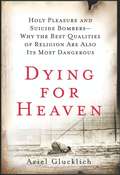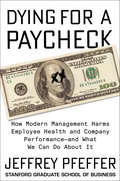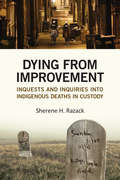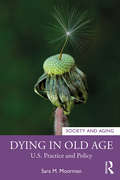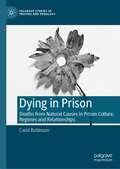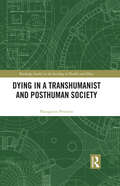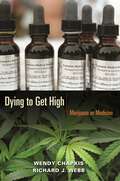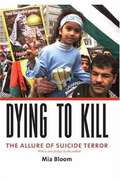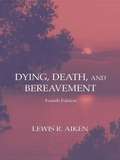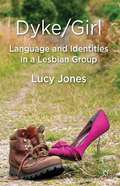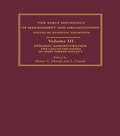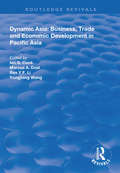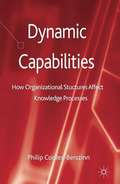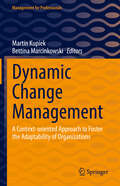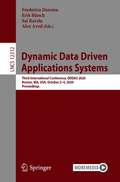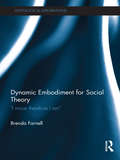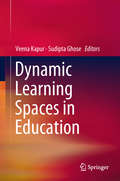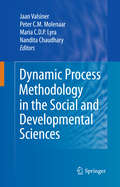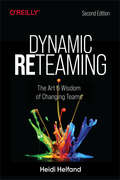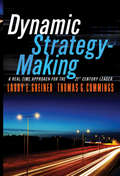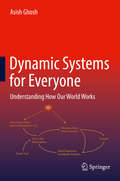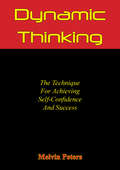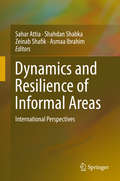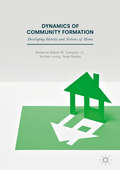- Table View
- List View
Dying for Heaven
by Ariel GlucklichWhy do terrorists do what they do? Not only are religiously motivated terrorists willing to self-destruct to achieve their goals, but neither threats nor incentives consistently prevent their devastating acts. Compounding this is the fact that soon extremist nations and terrorist groups in the Middle East and Asia will have nuclear weapons and may be driven by religion to use them. Is nuclear terror inevitable or can it be prevented? Ariel Glucklich, Georgetown professor of religion and advisor to the U.S. defense community, reveals the fallacy of our country's three major assumptions about the motivations that lie behind terrorism: that religious terrorists are acting out of hatred for us, that belief in paradise is the chief factor in their willingness to die for their cause, and that religious extremism is always irrational. The astonishing reality Glucklich reveals is that these radicals sincerely believe they are motivated by love, actually are attempting to fight internal enemies or "heretics" within their own societies, and desire fame and honor in the here and now, rather than a promised afterlife in heaven. Dying for Heaven offers a groundbreaking theory of religion and religious destructiveness; the book examines the motivations fueling those who perpetrate religious violence around the globe--from Al Qaeda and other Islamic terrorists to violent Hindu nationalists, from Jewish-Zionist fundamentalists in Israel to leaders in Iran's race for nuclear weapons, and to Christian messianic defenders of American power. The continuing rise of religion as a global force and the proliferation of nuclear weapons create a unique challenge for policy advisors, who now must understand how far religious extremists will go toward nuclear annihilation. Dying for Heaven provides the key for understanding the religious drive to self-destruct and offers ways to combat the culture of suicide terrorism.
Dying for a Paycheck: How Modern Management Harms Employee Health and Company Performance -- and What We Can Do About It
by Jeffrey PfefferIn one survey, 61 percent of employees said that workplace stress had made them sick and 7 percent said they had actually been hospitalized. Job stress costs US employers more than $300 billion annually and may cause 120,000 excess deaths each year. In China, 1 million people a year may be dying from overwork. People are literally dying for a paycheck. And it needs to stop.In this timely, provocative book, Jeffrey Pfeffer contends that many modern management commonalities such as long work hours, work-family conflict, and economic insecurity are toxic to employees—hurting engagement, increasing turnover, and destroying people’s physical and emotional health—and also inimical to company performance. He argues that human sustainability should be as important as environmental stewardship. <P><P>You don’t have to do a physically dangerous job to confront a health-destroying, possibly life-threatening, workplace. Just ask the manager in a senior finance role whose immense workload, once handled by several employees, required frequent all-nighters—leading to alcohol and drug addiction. Or the dedicated news media producer whose commitment to getting the story resulted in a sixty-pound weight gain thanks to having no down time to eat properly or exercise. Or the marketing professional prescribed antidepressants a week after joining her employer.In Dying for a Paycheck, Jeffrey Pfeffer marshals a vast trove of evidence and numerous examples from all over the world to expose the infuriating truth about modern work life: even as organizations allow management practices that literally sicken and kill their employees, those policies do not enhance productivity or the bottom line, thereby creating a lose-lose situation.Exploring a range of important topics including layoffs, health insurance, work-family conflict, work hours, job autonomy, and why people remain in toxic environments, Pfeffer offers guidance and practical solutions all of us—employees, employers, and the government—can use to enhance workplace wellbeing. We must wake up to the dangers and enormous costs of today’s workplace, Pfeffer argues. Dying for a Paycheck is a clarion call for a social movement focused on human sustainability. Pfeffer makes clear that the environment we work in is just as important as the one we live in, and with this urgent book, he opens our eyes and shows how we can make our workplaces healthier and better.
Dying from Improvement
by Sherene RazackNo matter where in Canada they occur, inquiries and inquests into untimely Indigenous deaths in state custody often tell the same story. Repeating details of fatty livers, mental illness, alcoholic belligerence, and a mysterious incapacity to cope with modern life, the legal proceedings declare that there are no villains here, only inevitable casualties of Indigenous life.But what about a sixty-seven-year-old man who dies in a hospital in police custody with a large, visible, purple boot print on his chest? Or a barely conscious, alcoholic older man, dropped off by police in a dark alley on a cold Vancouver night? Or Saskatoon's infamous and lethal starlight tours, whose victims were left on the outskirts of town in sub-zero temperatures? How do we account for the repeated failure to care evident in so many cases of Indigenous deaths in custody?In Dying from Improvement, Sherene H. Razack argues that, amidst systematic state violence against Indigenous people, inquiries and inquests serve to obscure the violence of ongoing settler colonialism under the guise of benevolent concern. They tell settler society that it is caring, compassionate, and engaged in improving the lives of Indigenous people - even as the incarceration rate of Indigenous men and women increases and the number of those who die in custody rises.Razack's powerful critique of the Canadian settler state and its legal system speaks to many of today's most pressing issues of social justice: the treatment of Indigenous people, the unparalleled authority of the police and the justice system, and their systematic inhumanity towards those whose lives they perceive as insignificant.
Dying in Old Age: U.S. Practice and Policy (Society and Aging Series)
by Sara M. MoormanThree-quarters of deaths in the U.S. today occur to people over the age of 65, following chronic illness. This new experience of "predictable death" has important consequences for the ways in which societies structure their health care systems, laws, and labor markets. Dying in Old Age: U.S. Practice and Policy applies a sociological lens to the end of life, exploring how macrosocial systems and social inequalities interact to affect individual experiences of death in the United States. Using data from the National Health and Aging Trends Study and Pew Research Center Survey of Aging and Longevity, this book argues that predictable death influences the entire life course and works to generate greater social disparities. The volume is divided into sections exploring demography, the circumstances of dying people, and public policy affecting dying people and their families. In exploring these interconnected factors, the author also proposes means of making "bad death" an avoidable event. As one of the first books to explore the social consequences of end of life practice, Dying in Old Age will be of great interest to graduate and advanced undergraduate students in sociology, social work, and public health, as well as scholars and policymakers in these areas.
Dying in Prison: Deaths from Natural Causes in Prison Culture, Regimes and Relationships (Palgrave Studies in Prisons and Penology)
by Carol RobinsonThis book uses empirical data gathered using ethnographic methods in two contrasting prisons to provide a rare insight into death and dying in prisons in the UK. The majority of deaths in prison custody in England and Wales result from natural causes, yet the experiences of people dying in prison and the impact of these deaths on the wider prison are under-researched areas. It provides a novel insight into the impact of deaths from natural causes on the prison as an institution and challenges existing work juxtaposing occupational philosophies of ‘care’ and ‘control’. It also identifies how end of life care is provided in prisons and the impact this has on culture and relationships shows how deaths from natural causes in prison custody ‘soften’ prison regimes, culture and relationships. It speaks to an international audience by drawing on the global literature including from the US.
Dying in a Transhumanist and Posthuman Society
by Panagiotis PentarisExploring both the intrapersonal (moral) and interpersonal (ethical) nature of death and dying in the context of their development (philosophical), Dying in a Transhumanist and Posthuman Society shows how death and dying have been and will continue to be governed in any given society. Drawing on transhumanism and discourses about posthumanity, life prolongation and digital life, the book analyses death, dying and grief via the governance of dying. It states that the bio-medical dimensions of our understanding of death and dying have predominated not only the discourses about death in society and the care of the dying, but their policy and practice as well. It seeks to provoke thinking beyond the benefits of technology and within the confinements of the world transhumanists describe. This book is written for all who have an interest in thanatology (i.e. death studies) but will be useful specifically to those investigating the experiences of dying and grieving in contemporary societies, wherein technology, biology and medicine continuously advance. Thus, the manuscript will be of interest to researchers in a broad range of areas including health and social care, social policy, anthropology, sociology, philosophy, cultural studies, and, of course, thanatology.
Dying to Get High: Marijuana as Medicine
by Wendy Chapkis Richard J. WebbAn inside look at how patients living with terminal illness created one of the country’s first medical marijuana collectivesMarijuana as medicine has been a politically charged topic in this country for more than three decades. Despite overwhelming public support and growing scientific evidence of its therapeutic effects (relief of the nausea caused by chemotherapy for cancer and AIDS, control over seizures or spasticity caused by epilepsy or MS, and relief from chronic and acute pain, to name a few), the drug remains illegal under federal law. In Dying to Get High, noted sociologist Wendy Chapkis and Richard J. Webb investigate one community of seriously-ill patients fighting the federal government for the right to use physician-recommended marijuana. Based in Santa Cruz, California, the Wo/Men’s Alliance for Medical Marijuana (WAMM) is a unique patient-caregiver cooperative providing marijuana free of charge to mostly terminally ill members. For a brief period in 2004, it even operated the only legal non-governmental medical marijuana garden in the country, protected by the federal courts against the DEA.Using as their stage this fascinating profile of one remarkable organization, Chapkis and Webb tackle the broader, complex history of medical marijuana in America. Through compelling interviews with patients, public officials, law enforcement officers and physicians, Chapkis and Webb ask what distinguishes a legitimate patient from an illegitimate pothead, good drugs from bad, medicinal effects from just getting high. Dying to Get High combines abstract argument and the messier terrain of how people actually live, suffer and die, and offers a moving account of what is at stake in ongoing debates over the legalization of medical marijuana.
Dying to Kill: The Allure of Suicide Terror
by Mia BloomWhat motivates suicide bombers in Iraq and around the world? Can winning the hearts and minds of local populations stop them? Will the phenomenon spread to the United States? These vital questions are at the heart of this important book. Mia Bloom examines the use, strategies, successes, and failures of suicide bombing in Asia, the Middle East, and Europe and assesses the effectiveness of government responses. She argues that in many instances the efforts of Israel, Russia, and the United States in Iraq have failed to deter terrorism and suicide bombings. Bloom also considers how terrorist groups learn from one another, how they respond to counterterror tactics, the financing of terrorism, and the role of suicide attacks against the backdrop of larger ethnic and political conflicts. Dying to Kill begins with a review of the long history of terrorism, from ancient times to modernity, from the Japanese Kamikazes during World War II, to the Palestinian, Tamil, Iraqi, and Chechen terrorists of today. Bloom explores how suicide terror is used to achieve the goals of terrorist groups: to instill public fear, attract international news coverage, gain support for their cause, and create solidarity or competition between disparate terrorist organizations. She contends that it is often social and political motivations rather than inherently religious ones that inspire suicide bombers. In her chapter focusing on the increasing number of women suicide bombers and terrorists, Bloom examines Sri Lanka, where 33 percent of bombers have been women; Turkey, where the PKK used women feigning pregnancy as bombers; and the role of the Black Widows in the Chechen struggle against Moscow. The motives of individuals, whether religious or nationalist, are important but the larger question is, what external factors make it possible for suicide terrorism to flourish? Bloom describes these conditions and develops a theory of why terrorist tactics work in some instances and fail in others.
Dying, Death, and Bereavement
by Lewis R. AikenThis book is a brief but comprehensive survey of research, writings, and professional practices concerned with death and dying. It is interdisciplinary and eclectic--medical, psychological, religious, philosophical, artistic, demographics, bereavement, and widowhood are all considered--but with an emphasis on psychological aspects. A variety of viewpoints and research findings on topics subsumed under "thanatology" receive thorough consideration. Questions, activities, and projects at the end of each chapter enhance reflection and personalize the material. This fourth edition features material on: * moral issues and court cases concerned with abortion and euthanasia; * the widespread problem of AIDS and other deadly diseases; * the tragedies occasioned by epidemics, starvation, and war; and * the resumption of capital punishment in many states. The book's enhanced multicultural tone reflects the increased economic, social, and physical interdependency among the nations of the world. Topics receiving increased attention in the fourth edition are: terror management; attitudes and practices concerning death; cross-cultural concepts of afterlife; gallows humor, out-of-body experiences; spiritualism; mass suicide; pet and romantic death; euthanasia; right to die; postbereavement depression; firearm deaths in children; children's understanding of death; child, adolescent, adult, and physician-assisted suicide; religious customs and death; confronting death; legal issues in death, dying and bereavement; death education; death music; creativity and death; longevity; broken heart phenomenon; beliefs in life after death; new definitions of death; children's acceptance of a parent's death; terminal illness; and the politics of death and dying.
Dyke/Girl: Language and Identities in a Lesbian Group
by Lucy JonesThis book explores the construction of identities within a lesbian group, outlining interactive tactics used in the production of mutually-negotiated norms of authenticity. Using ethnography and discourse analysis, a range of group-specific personae are revealed to be continually reworked and reproduced within the women's interaction.
Dynamic Administration: The Collected Papers of Mary Parker Follett
by L. Urwick Henry C. MetcalfMary Parker Follett was a prominent business philosopher of the period, who agreed with Sheldon about the need to emphasize human factors in management, but placing greater stress on the need to develop a science of cooperation. According to Follett, what she called her 'Law of the Situation' could be a means for bridging the gap between an ideal of scientific management and the unilateral position that it seemed to involve in practice. In effect she was proposing the same collaboration between leaders and subordinates that was usually to be found between leaders of the same rank.
Dynamic Asia: Business, Trade and Economic Development in Pacific Asia (Routledge Revivals)
by Marcus A. Doel Ian G. Cook Rex Y.F. Li Yongjiang WangPublished in 1998, this book examines the challenges and opportunities for international business and trade in the Asia-Pacific region, highlighting the dynamic and complexities of the region.
Dynamic Capabilities
by Philip Cordes-BerszinnThe concept of dynamic capabilities, especially in terms of organizational knowledge processes, has become the predominant paradigm for the explanation of competitive advantages. However, major unsolved - or at least insufficiently solved - problems are first their measurement and second their management by concrete managerial options, such as design options of organizational structures. Dynamic Capabilities provides an integrated descriptive model of both dynamic capabilities and organizational structures that allows characterizing, classifying and a comparison. It develops a logic system of a multitude of combinatorial possibilities between their variables, and it develops a complex and integrated system of associated empirically based and qualitatively deduced hypotheses. Therewith, it serves as a terminological and analytical foundation for the identification of knowledge-based dynamic capabilities in organizations and for a targeted design of organizational structures that enable and foster dynamic capability processes such as knowledge transfer and knowledge absorption.
Dynamic Change Management: A Context-oriented Approach to Foster the Adaptability of Organizations (Management for Professionals)
by Martin Kupiek Bettina MarcinkowskiThis book offers a new perspective on change projects in organizations. While traditional approaches of analysis, planning, and implementation can be too slow and unsatisfactory in dynamic environments, this book introduces a context-oriented, dynamic approach that seamlessly integrates technology, processes, and people into the organizational framework. Drawing from organizational theory, it prioritizes both the formal and informal aspects of an organization's structure and culture, and emphasizes the emotional side of change. It provides practical guidance on using emotion concepts to facilitate change in a positive way, and covers key supporting technologies, communication strategies, and human resource considerations. In addition to describing the approach, the book provides helpful tips on selecting the right consultants and embedding change know-how for future initiatives. It is an indispensable resource for anyone leading a change project or looking to improve their organization's ability to adapt. So why settle for a traditional approach when you can achieve meaningful change through a dynamic, context-oriented approach?
Dynamic Data Driven Application Systems: Third International Conference, DDDAS 2020, Boston, MA, USA, October 2-4, 2020, Proceedings (Lecture Notes in Computer Science #12312)
by Sai Ravela Erik Blasch Alex Aved Frederica DaremaThis book constitutes the refereed proceedings of the Third International Conference on Dynamic Data Driven Application Systems, DDDAS 2020, held in Boston, MA, USA, in October 2020. The 21 full papers and 14 short papers presented in this volume were carefully reviewed and selected from 40 submissions. They cover topics such as: digital twins; environment cognizant adaptive-planning systems; energy systems; materials systems; physics-based systems analysis; imaging methods and systems; and learning systems.
Dynamic Embodiment for Social Theory: I move therefore I am
by Brenda FarnellThis book presents a series of ontological investigations into an adequate theory of embodiment for the social sciences. Informed by a new realist philosophy of causal powers, it seeks to articulate a concept of dynamic embodiment, one that positions human body movement, and not just ‘the body’ at the heart of theories of social action. It draws together several lines of thinking in contemporary social science: about the human body and its movements; adequate meta-theoretical explanations of agency and causality in human action; relations between moving and talking; skill and the formation of knowledge; metaphor, perception and the senses; movement literacy; the constitution of space and place, and narrative performance. This is an ontological inquiry that is richly grounded in, and supported by anthropological ethnographic evidence. Using the work of Rom Harré, Roy Bhaskar, Charles Varela and Drid Williams this book applies causal powers theory to a revised ontology of personhood, and discusses why the adequate location of human agency is crucial for the social sciences. The breakthrough lies in fact that new realism affords us an account of embodied human agency as a generative causal power that is grounded in our corporeal materiality, thereby connecting natural/physical and cultural worlds. Dynamic Embodiment for Social Theory is compelling reading for students and academics of the social sciences, especially anthropologists and sociologists of ‘the body’, and those interested in new developments in critical realism.
Dynamic Interpretation of Early Cities in Ancient China
by Hong XuThis book offers an archaeological study on China’s ancient capitals. Using abundant illustrations of ancient capital sites, it verifies the archaeological discoveries with documentary records. The author introduces the dynamical interpretation of each ancient capital to the interpretation of the entire development history of China's ancient capitals. The book points out that for most of the almost 2000 years from the earliest Erlitou (二里头)to the Ye city (邺城), there was an era where ancient capitals didn’t have outer enclosures due to factors such as the strong national power, the military and diplomatic advantage, the complexity of the residents, and the natural conditions. Thus an era of “the huge ancient capitals without guards” lasting for over 1000 years formed. The concept that “China’s ancient capitals don’t have outer enclosures” presented in the book questions the traditional view that “every settlement has walled enclosures”. Combining science with theory, it offers researchers of history a clear understanding of the development process of China’s ancient capitals.
Dynamic Learning Spaces in Education
by Veena Kapur Sudipta GhoseThis volume discusses the need for a major paradigm shift in educational practice in the current digital and globalized world. It establishes a bridge between theory and praxis and revisits the objectives of learning and its modalities within the context of a rapidly evolving global world order. This volume includes perspectives from different countries on creating a dynamic and adaptive education system that encourages creativity, leadership, flexibility, and working in virtual as well as inclusive environments. The four sections include chapters that discuss creating meaningful learning environments, preparing teachers for new age classrooms, the digital learning space, fostering change in classrooms, and importantly also includes cases and experiments from schools. The authors are teacher educators, teachers and researchers, and each chapter, while being deeply rooted in theory, is juxtaposed with informed practice, making the suggestions easy to implement in different settings. This is an important resource for researchers and practitioners associated with education systems in creating engaging, meaningful and future-ready education practices.
Dynamic Process Methodology in the Social and Developmental Sciences
by Maria C.D.P. Lyra Nandita Chaudhary Jaan Valsiner Peter C. MolenaarAll psychological processes--like biological and social ones--are dynamic. Phenomena of nature, society, and the human psyche are context bound, constantly changing, and variable. This feature of reality is often not recognized in the social sciences where we operate with averaged data and with homogeneous stereotypes, and consider our consistency to be the cornerstone of rational being. Yet we are all inconsistent in our actions within a day, or from, one day to the next, and much of such inconsistency is of positive value for our survival and development. Our inconsistent behaviors and thoughts may appear chaotic, yet there is generality within this highly variable dynamic. The task of scientific methodologies--qualitative and quantitative--is to find out what that generality is. It is the aim of this handbook to bring into one framework various directions of construction of methodology of the dynamic processes that exist in the social sciences at the beginning of the 21st century. This handbook is set up to bring together pertinent methodological scholarship from all over the world, and equally from the quantitative and qualitative orientations to methodology. In addition to consolidating the pertinent knowledge base for the purposes of its further growth, this book serves the major educational role of bringing practitioners--students, researchers, and professionals interested in applications--the state of the art know-how about how to think about extracting evidence from single cases, and about the formal mathematical-statistical tools to use for these purposes.
Dynamic Reteaming: The Art and Wisdom of Changing Teams
by Heidi HelfandYour team will change whether you like it or not. People will come and go. Your company might double in size or even be acquired. In this practical book, author Heidi Helfand shares techniques for reteaming effectively. Engineering leaders will learn how to catalyze team change to reduce the risk of attrition, learning and career stagnation, and the development of knowledge silos.Based on research into well-known software companies, the patterns in this book help CTOs and team managers effectively integrate new hires into an existing team, manage a team that has lost members, or deal with unexpected change. You’ll learn how to isolate teams for focused innovation, rotate team members for knowledge sharing, break through organizational apathy, and more.You’ll explore:Real-world examples that demonstrate why and how organizations reteamFive reteaming patterns: One by One, Grow and Split, Isolation, Merging, and SwitchingTactics to help you master dynamic reteaming in your companyStories that demonstrate problems caused by reteaming anti-patterns
Dynamic Strategy-Making
by Thomas G. Cummings Larry E. GreinerPraise for Dynamic Strategy-Making"An astonishingly timely, hopeful, and important book that recasts and freshly imagines strategy-making and integrates theory with practice in the field of strategic management. A must-read for all those who want to learn more about the future of strategy practice and become more skillful at it." -Warren Bennis, Distinguished Professor of Business, University of Southern California; and coauthor, Transparency"This is one of the most valuable resources ever created for strategists and leaders in organizations. It uniquely combines concepts of leadership and organization with strategy content and implementation in a pragmatic and integrated approach that makes tremendous sense for our times. With concrete cases, it provides a clear road map for those who want and need to do a better job of formulating and implementing strategy." -David A. Nadler, vice chairman, Marsh & McLennan Companies; senior partner, Oliver Wyman-Delta Organization and Leadership; and author, Building Better Boards and Competing By Design"The authors correctly focus on the new dynamic of 24/7 competition and change and the need for organizations to be fast, fluid, and flexible. It is a must-read for managers of tomorrow and offers a number of practical insights and lessons on how to proceed with strategy execution that can be readily adopted in any organization. It is a call to action that few can afford to ignore." -Manjit Singh, chairman, Sony Entertainment Television, India; and former CEO, Compete Inc., High Circle, Future Step, and Korn/Ferry International
Dynamic Systems for Everyone: Understanding How Our World Works
by Asish GhoshSystems are everywhere and we are surrounded by them. We are a complex amalgam of systems that enable us to interact with an endless array of external systems in our daily lives. They are electrical, mechanical, social, biological, and many other types that control our environment and our well-being. By appreciating how these systems function, will broaden our understanding of how our world works. Readers from a variety of disciplines will benefit from the knowledge of system behavior they will gain from this book and will be able to apply those principles in various contexts. The treatment of the subject is non-mathematical, and the book considers some of the latest concepts in the systems discipline, such as agent based systems, optimization, and discrete events and procedures. The diverse range of examples provided in this book, will allow readers to:Apply system knowledge at work and in daily life without deep mathematical knowledge;Build models and simulate system behaviors on a personal computer; Optimize systems in many different ways;Reduce or eliminate unintended consequences;Develop a holistic world view .This book will enable readers to not only better interact with the systems in their professional and daily lives, but also allow them to develop and evaluate them for their effectiveness in achieving their designed purpose.Comments from Reviewers: “This is a marvelously well written introduction to Systems Thinking and System Dynamics - I like it because it introduces Systems Thinking with meaningful examples, which everyone should be able to readily connect” - Gene Bellinger, Organizational theorist, systems thinker, and consultant, Director Systems Thinking World “Excellent book ...very well written. Mr. Ghosh's world view of system thinking is truly unique” - Peter A. Rizzi, Professor Emeritus, University of Massachusetts Dartmouth “A thorough reading of the book provides an interesting way to view many problems in our society” –Bradford T. Stokes, Poppleton Chair and Professor Emeritus, The Ohio State University College of Medicine “This is a very good and very readable book that is a must read for any person involved in systems theory in any way - which may actually include just about everyone” - Peter G. Martin, Vice President Business Value Consulting, Schneider Electric
Dynamic Thinking: The Technique For Achieving Self-confidence And Success
by Melvin PowersDynamic Thinking will teach you simple truths that are the basis of all success and will provide effective techniques for putting them to work in your life. You will learn how to harness the power of your conscious and subconscious minds and use that power to accomplish whatever you want.Melvin Powers' classic book Dynamic Thinking is your blueprint to dynamic living. It provides you with an opportunity to build the life you've wanted but never dared to believe you could have.--Wilshire Book Company
Dynamics and Resilience of Informal Areas
by Sahar Attia Shahdan Shabka Zeinab Shafik Asmaa IbrahimThis volume provides visionary approaches within the multi-disciplines engaged with informal settlements covering three main themes; 'Innovative Policies and Strategies to Informal Urbanism'; 'Production, Operation and the Life-World of Urban Space' and finally 'The Dynamics of Informal Settlements'. The book reflects multi-disciplinary experiences dealing with informality, where authors from a number of global regions present cases, practices and ideologies related to their respective context. This is elaborated through fifteen selected papers, most of which, were presented at the International conference: ARCHCAIRO 6 (the 6th International Conference), "RESPONSIVE URBANISM IN INFORMAL AREAS TOWARDS A REGIONAL AGENDA FOR HABITAT III". The conference was organized as a collaborative activity within the "Informal Urbanism Hub" of the HABITAT University Network Initiative (UNI), the Regional Office for Arab Countries, and Cairo University, aiming at reducing the gap between academia and practice.
Dynamics of Community Formation
by Jr. Robert W. Compton Ho Hon Leung Yaser RoblesThis interdisciplinary work discusses the construction, maintenance, evolution, and destruction of home and community spaces, which are central to the development of social cohesion. By examining how people throughout the world form different communities to establish a sense of home, the volume surveys the formation of identity within the context of rapid development, global and domestic neoliberal and political governmental policies, and various societal pressures. The themes of cooperation, conflict, inclusion, exclusion, and balance require negotiation between different actors (e. g. , the state, professional developers, social activists, and residents) as homes and communities develop.
